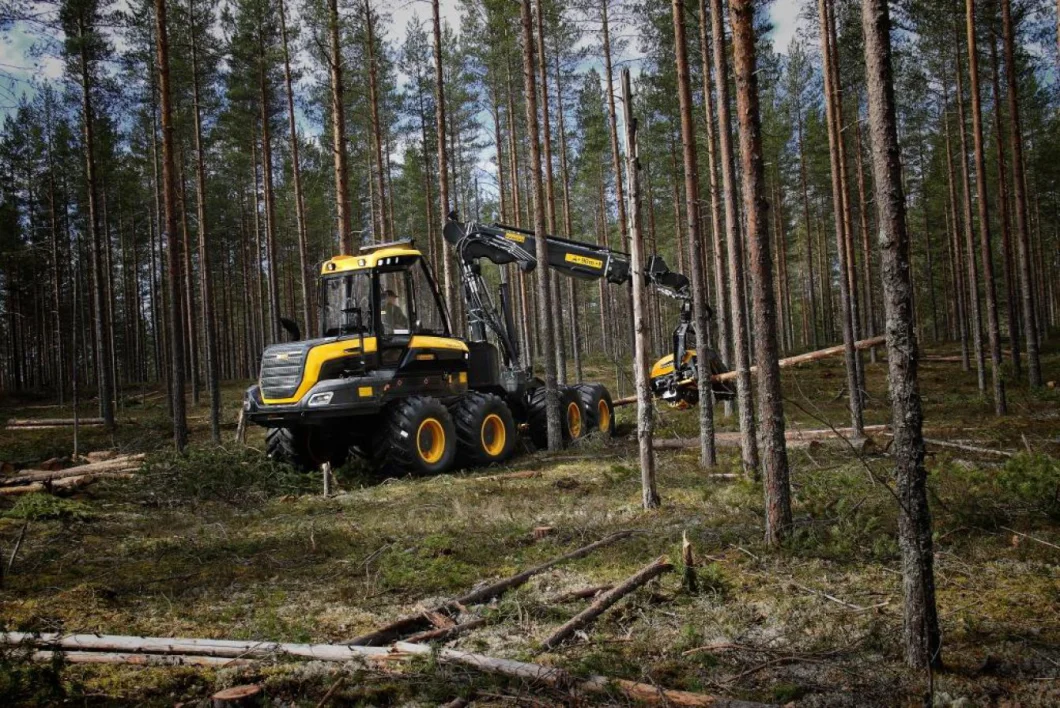Forestry services: pivotal role in the value chain
According to the State of European Forest 2015 published by the Ministerial Conference on the Protection of Forests in Europe (Forest Europe), Forests and other wooded land cover 160 million ha and 21 million ha respectively in Europe.
 This together means more than 42 % of EU land area is covered with forest and other wooded land, with steadily increase over the past few decades.
This together means more than 42 % of EU land area is covered with forest and other wooded land, with steadily increase over the past few decades.
There is great diversity of natural forest types, forest covers, and forest ownership structures in the EU. Forests are one of Europe's most important renewable resources and provide multiple benefits to society and the economy. They are one of Europe's main sources of biodiversity. Forests are a key resource for improving quality of life and job creation, in particular in rural areas, and protects and provides ecosystem services to all citizens.
Forests and forestry play in a major role in the future growing bioeconomy.
Total growing stock of forest and other wooded land in EU-28 countries is 26,5 billion m3. Annual change in this is 284 million m3/year (1,3%).
Forestry contractors
Forestry contracting companies are mostly micro, small or medium size companies and many of them family owned companies. Typical forestry contracting company employs 1-10 workers, in some specialized and seasonal work they might need tens of workers temporarily for shorter periods. They are now about 50,000 in numbers and 100,000 active people, present at all stages of the development of forests.
At the service of their customers, they provide silviculture, wood harvesting and energy wood delivery services to farmers, cooperatives and private forest owners, wood-based industry, bioenergy industry, local authorities and public institutions.
Total fellings in EU-28 forests were 522,3 million cubic meter by 2010. Most of this is done by private forestry contractors. In addition, tens of millions of cubic meters of forest chips (also business area for forestry contractors) are produced for bioenergy production.
Forestry works are exercised by entrepreneurs in strict compliance with safety rules of the employees and protection of the environment. Forestry contractors implement on the ground the principles of sustainable management of forests. At the same time, forest certifications (PEFC or other schemes) grow continually in the sector.
Forestry contractors ensure the provision of quality timber production, a simplified management of the plots, the qualitative stand improvement and growth of the most beautiful trees. Some entrepreneurs are diversifying their activities to forest management, supply of wood energy, selling firewood, logistics and transportation.
Different operations
There are three major categories of works performed in the forest: silvicultural operations, harvesting/forwarding operations and wood chip production.
Silvicultural operations are to prepare the ground, eliminate herbaceous or shrubby competition, reforestation (seedlings or plants), prevention and fight of forest fires, restoration of forest hydrologic systems, creation of green areas, landscaping and improve the quality of individual trees. The operator then uses either hand tools (brush cutter, pruner, planting cane...) or mechanized tools (tractor, plough, spreader, sprayer...).
Harvesting operations aim to cut down trees, delimb branches and cut fallen trees into logs according to technical specifications then forward them to a landing area (storage mostly along forest road side). The harvesting is done either manually(chainsaw) or mechanically by special forestry machinery(harvester). There are several ways to skid fallen trees: the forwarder (self-propelled equipment with a crane and a trailer), the skidder (self-propelled equipment with a winch or a clamp), the aerial cable (used in mountains or in high ecological interest areas) or, rarely, horse (used in strong ecological interest areas).
Forest wood chips are mainly made of non industrial quality roundwood and wood branches. In the forest these are handled by typical forest machines. On forest roadside storage or on a wood terminal energy wood is either chipped or crushed by a special machinery.
In countries as diverse as Belgium, Bulgaria, Denmark, Finland, France and Sweden, forestry contractors are executing between 70% & 90% of silvicultural operations and between 80% & 99% of harvesting/forwarding operations.
Moreover, some contractors diversified into forest management and/or sale of firewood. These diversifications have several reasons: access to new markets, seasonality of works, additional services for clients...
Competences of the contractors
The contractor's work can be distinguished into three main type of activities:
- Administrative work/selling: relationship with banks, insurances and social secretariat, invoicing, tax and social issues, reporting of activities (administrations, town halls, yards ...), regulatory monitoring, upgrading of hardware standards, marketing, looking for customers and suppliers, negotiations with clients, accounting, human resources management, training, pay slips...
- On-site work: daily management, environmental and safety rules, team management, negotiation of prices of services, mapping, knowledge and application of new technical development, maintenance of the machines, improved productivity, transfer of machines, ...
- Work shop: maintenance and repair of tools and machinery, inventory management of stocks, adapted premises for chemical products, use of protective equipment for workshops...
Thus, the forestry contractors need to be versatile and to regularly upgrade his/her skills: business management and negotiation, forest certification, sustaiability, mechanics, hydraulics, IT, maintenance, regulations, mapping, analysis of accounting documents, tools and repair machinery...
The sustainably managed forests need viable and sustainable forestry contractors


















